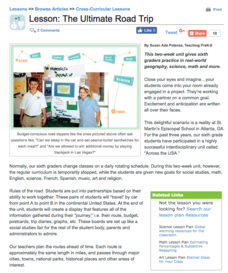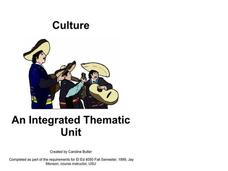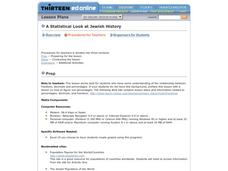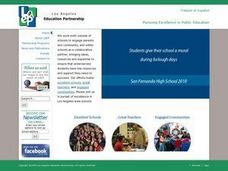K20 LEARN
If Our Classroom Were The World: Proportions And Percents
It's a small world after all. Classmates consider world population, languages, and religions in a cross-curricular lesson. Applying percentages and proportions, they determine what the class make-up would be if the class represented the...
Curated OER
If the World Were a Village Activities
Sixth graders complete activities about the book If the World Were a Village by David J. Smith. In this interdisciplinary lesson, 6th graders complete a math activity converting fractions into decimals and percentages and a geography...
Curated OER
Geometry and Islam: Religious Beliefs Made Visual
Students examine the importance of geometric patterns in Muslim countries. Using cutout patterns, they replicate the designs seen in Islam and color them. They put their completed designs on a bulletin board to show to the school.
Curated OER
The Ultimate Road Trip
Sixth graders experience and practice real-world geography, science and math as they imagine planning out the ultimate road trip. They set goals and maintain a daily budget as they are given a set of rules as they plan their road trip...
Curated OER
Defining Culture
Second graders define the term culture and are exposed to a variety of cultures from around the world. They read books, play Native American games, develop a class book that examines their own culture and, after examining currencies from...
Curated OER
Integrating Gandhian Principles of Communal Unity in Mathematics
Fourth through sixth graders incorporate Gandhian principles into Math curriculum. They explore Gandhi's teachings on communal unity and economic equality. This has quite a bit of information about Gandhi and his observations and...
Curated OER
A Statistical Look at Jewish History
Young scholars complete their examination over the Jewish Diaspora. Using population figures, they discover the importance of percentages in exploring trends. They use their own ethnic group and determine how it is represented in the...
Curated OER
Graphing the Past Using Today's Technology
Eighth graders research and gather information from such sources as Microsoft Encarta, World Wide Web sites, and other sources using computer software to collect data.
Curated OER
The Middle-East; Water and Life
Tenth graders examine the physical and cultural impressions made by water in the Middle East, as well as their own lives, through exercises in reading, writing, geography and art. They explore how water as an economic good drives...
Curated OER
Tzedakah: How Can We Help?
Students define what constitutes a nutritious meal, the price of a healthy meal, and understand that some people can't afford healthy meals. In this healthy meals lesson plan, students estimate and research the cost of a nutritious meal,...
Curated OER
Quilt Squared
Students study West Virginia quilts. In this mathematics instructional activity, students use symmetry, geometric shapes, and patterns to create their own quilt square.
Curated OER
Cambodian New Year
Students compare and contrast the New Year celebration in Cambodia to the celebration in the United States. They mathematically determine the amount of beans added to the "mountain" during the three day celebration.
Curated OER
Ancient Egypt
In this Ancient Egypt worksheet, students read a 2 page article on Ancient Egypt, answer 3 statements as true or false and choose which multiple choice answers best answers 3 questions/statements.
Curated OER
The Probability that God Exists
In this probability worksheet, high schoolers are presented with how a scientist calculated the chance that God exists. References to scientists, mathematicians, and books are made.
Other popular searches
- Major World Religions
- Religions of the World
- Three World Religions
- 5 Major World Religions
- Five Major World Religions
- Compare World Religions
- World Religions Poster
- Projects on World Religions
- Comparing World Religions
- World Religions Jewish
- History World Religions
- World Religions Worksheets















